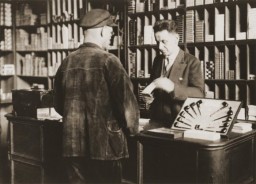You searched for: used%E4%BA%A4%E6%98%93%E7%A8%8B%E5%BA%8F%E5%BE%8C%E8%87%BA%E6%BA%90%E7%A2%BC%E3%80%90tg%EF%BF%BD%EF%BF%BD%EF%BF%BD%EF%BF%BD%EF%BF%BD%EF%BF%BD%EF%BF%BD%EF%BF%BD%EF%BF%BD%40ek7676%E3%80%91%E5%B9%B3%E5%8F%B0%E5%8C%85%E7%BD%91%E6%90%AD%E5%BB%BAusd%E4%BA%A4%E6%98%93%E7%A8%8B%E5%BA%8F%E5%BE%8C%E8%87%BA%E6%BA%90%E7%A2%BC%E3%80%90tg%EF%BF%BD%EF%BF%BD%EF%BF%BD%EF%BF%BD%EF%BF%BD%EF%BF%BD%EF%BF%BD%EF%BF%BD%EF%BF%BD%40ek7676%E3%80%91%E5%B9%B3%E5%8F%B0%E5%8C%85%E7%BD%91%E6%90%AD%E5%BB%BAivkcss1pgu
<< Previous | Displaying results 1776-1800 of 1832 for "used%E4%BA%A4%E6%98%93%E7%A8%8B%E5%BA%8F%E5%BE%8C%E8%87%BA%E6%BA%90%E7%A2%BC%E3%80%90tg%EF%BF%BD%EF%BF%BD%EF%BF%BD%EF%BF%BD%EF%BF%BD%EF%BF%BD%EF%BF%BD%EF%BF%BD%EF%BF%BD%40ek7676%E3%80%91%E5%B9%B3%E5%8F%B0%E5%8C%85%E7%BD%91%E6%90%AD%E5%BB%BAusd%E4%BA%A4%E6%98%93%E7%A8%8B%E5%BA%8F%E5%BE%8C%E8%87%BA%E6%BA%90%E7%A2%BC%E3%80%90tg%EF%BF%BD%EF%BF%BD%EF%BF%BD%EF%BF%BD%EF%BF%BD%EF%BF%BD%EF%BF%BD%EF%BF%BD%EF%BF%BD%40ek7676%E3%80%91%E5%B9%B3%E5%8F%B0%E5%8C%85%E7%BD%91%E6%90%AD%E5%BB%BAivkcss1pgu" | Next >>
-
William (Bill) Lowenberg describes the importance of bonds of friendship among young people imprisoned in the Westerbork camp
Oral HistoryAs a boy, Bill attended school in Burgsteinfurt, a German town near the Dutch border. After the Nazis came to power in Germany in January 1933, Bill experienced increasing antisemitism and was once attacked on his way to Hebrew school by a boy who threw a knife at him. In 1936, he and his family left Germany for the Netherlands, where they had relatives and thought they would be safe. However, after Germany invaded the Netherlands in May 1940, antisemitic legislation--including the order to wear the Jewish…
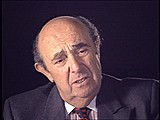
-
Thomas Buergenthal describes the charges brought at the International Military Tribunal at Nuremberg
Oral HistoryJudge Thomas Buergenthal was one of the youngest survivors of the Auschwitz and Sachsenhausen concentration camps. He immigrated to the United States at the age of 17. Judge Buergenthal devoted his life to international and human rights law. He served as chairman of the United States Holocaust Memorial Museum’s Committee on Conscience; was named the Lobingier Professor of Comparative Law and Jurisprudence at the George Washington University Law School; and served for a decade as the American judge at…
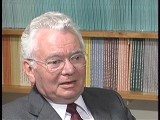
-
Thomas Buergenthal discusses whether it is ever too late to seek justice
Oral HistoryJudge Thomas Buergenthal was one of the youngest survivors of the Auschwitz and Sachsenhausen concentration camps. He immigrated to the United States at the age of 17. Judge Buergenthal devoted his life to international and human rights law. He served as chairman of the United States Holocaust Memorial Museum’s Committee on Conscience; was named the Lobingier Professor of Comparative Law and Jurisprudence at the George Washington University Law School; and served for a decade as the American judge at…
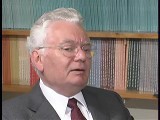
-
Aron (Dereczynski) Derman describes partisan activities near Vilna
Oral HistoryAron was born to a middle-class Jewish family in Slonim, a part of Poland between the two world wars. His parents owned a clothing store. After studying in a technical school, Aron worked as a motion-picture projectionist in a small town near Slonim. The Soviet army took over Slonim in September 1939. War broke out between Germany and the Soviet Union in June 1941. Aron returned to Slonim. The Germans soon occupied Slonim, and later forced the Jews into a ghetto. Aron was forced to work in an armaments…
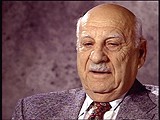
-
Ruth Webber describes the bitterness that she felt after the end of the war when she was in an orphanage in Krakow
Oral HistoryRuth was four years old when the Germans invaded Poland and occupied Ostrowiec. Her family was forced into a ghetto. Germans took over her father's photography business, although he was allowed to continue working outside the ghetto. Before the ghetto was liquidated, Ruth's parents sent her sister into hiding, and managed to get work at a labor camp outside the ghetto. Ruth also went into hiding, either in nearby woods or within the camp itself. When the camp was liquidated, Ruth's parents were split up.…
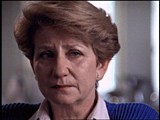
-
Peter Black describes the role of historians in researching war crimes cases for OSI
Oral HistoryIn the 1980s and 1990s, historian Peter Black worked for the US Department of Justice Office of Special Investigations, as part of a team tracking and prosecuting suspected war criminals. Black later served as the Senior Historian at the United States Holocaust Memorial Museum.
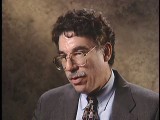
-
Leah Hammerstein Silverstein describes starvation in the Warsaw ghetto
Oral HistoryLeah grew up in Praga, a suburb of Warsaw, Poland. She was active in the Ha-Shomer ha-Tsa'ir Zionist youth movement. Germany invaded Poland in September 1939. Jews were forced to live in the Warsaw ghetto, which the Germans sealed off in November 1940. In the ghetto, Leah lived with a group of Ha-Shomer ha-Tsa'ir members. In September 1941, she and other members of the youth group escaped from the ghetto to a Ha-Shomer ha-Tsa'ir farm in Zarki, near Czestochowa, Poland. In May 1942, Leah became a courier…
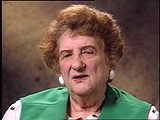
-
Blanka Rothschild describes the role of sharing and friendship in surviving the Lodz ghetto
Oral HistoryBlanka was an only child in a close-knit family in Lodz, Poland. Her father died in 1937. After the German invasion of Poland, Blanka and her mother remained in Lodz with Blanka's grandmother, who was unable to travel. Along with other relatives, they were forced into the Lodz ghetto in 1940. There, Blanka worked in a bakery. She and her mother later worked in a hospital in the Lodz ghetto, where they remained until late 1944 when they were deported to the Ravensbrueck camp in Germany. From Ravensbrueck,…
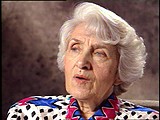
-
Raszka (Roza) Galek Brunswic describes a roundup in the Warsaw ghetto and her escape from deportation
Oral HistoryRoza's family moved to Warsaw in 1934. She had just begun college when Germany invaded Poland in 1939. In 1940, the Germans sealed the Warsaw ghetto, where her parents were shot during a roundup. Roza escaped and went into hiding. From her hiding place she saw the burning of the ghetto in the 1943 uprising. She had false papers stating she was a Polish Catholic (Maria Kowalczyk), and was deported by cattle train to Germany in June 1943. She worked on a farm until liberation in 1945.
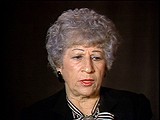
-
Charlene Schiff describes the German invasion of her town, Horochow, in the summer of 1941
Oral HistoryBoth of Charlene's parents were local Jewish community leaders, and the family was active in community life. Charlene's father was a professor of philosophy at the State University of Lvov. World War II began with the German invasion of Poland on September 1, 1939. Charlene's town was in the part of eastern Poland occupied by the Soviet Union under the German-Soviet Pact of August 1939. Under the Soviet occupation, the family remained in its home and Charlene's father continued to teach. The Germans…
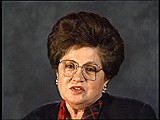
-
Leah Hammerstein Silverstein describes the emotions she felt upon arrival in Tel Aviv and Jerusalem after the war
Oral HistoryLeah grew up in Praga, a suburb of Warsaw, Poland. She was active in the Ha-Shomer ha-Tsa'ir Zionist youth movement. Germany invaded Poland in September 1939. Jews were forced to live in the Warsaw ghetto, which the Germans sealed off in November 1940. In the ghetto, Leah lived with a group of Ha-Shomer ha-Tsa'ir members. In September 1941, she and other members of the youth group escaped from the ghetto to a Ha-Shomer ha-Tsa'ir farm in Zarki, near Czestochowa, Poland. In May 1942, Leah became a courier…
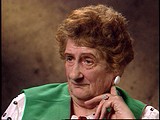
-
Ruth Webber describes the bitterness that she felt after the end of the war when she was in an orphanage in Krakow
Oral HistoryRuth was four years old when the Germans invaded Poland and occupied Ostrowiec. Her family was forced into a ghetto. Germans took over her father's photography business, although he was allowed to continue working outside the ghetto. Before the ghetto was liquidated, Ruth's parents sent her sister into hiding, and managed to get work at a labor camp outside the ghetto. Ruth also went into hiding, either in nearby woods or within the camp itself. When the camp was liquidated, Ruth's parents were split up.…

-
Gerda Haas describes postwar reunion with her father in the United States
Oral HistoryGerda was raised in a religious family in the small town of Ansbach, Germany, where her father was the Jewish butcher. She attended German schools until 1936, and then moved to Berlin to attend a Jewish school. She returned to her hometown after Kristallnacht in November 1938. Her family was then ordered to move to Munich, and in July 1939 her father left for England and then the United States. He was unable to arrange for the rest of his family to join him. Gerda moved to Berlin in 1939 to study nursing.…
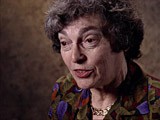
-
Irene Hizme and Rene Slotkin describe deportation to Auschwitz
Oral HistoryIrene and Rene were born Renate and Rene Guttmann. The family moved to Prague shortly after the twins' birth, where they were living when the Germans occupied Bohemia and Moravia in March 1939. A few months later, uniformed Germans arrested their father. Decades later, Irene and Rene learned that he was killed at the Auschwitz camp in December 1941. Irene, Rene, and their mother were deported to the Theresienstadt ghetto, and later to the Auschwitz camp. At Auschwitz, the twins were separated and subjected…
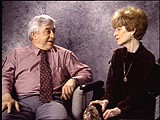
-
Siegfried Halbreich describes conditions and forced labor in the Gross-Rosen camp
Oral HistoryAfter Germany invaded Poland on September 1, 1939, Siegfried fled with a friend. They attempted to get papers allowing them to go to France, but were turned over to the Germans. Siegfried was jailed, taken to Berlin, and then transported to the Sachsenhausen camp near Berlin in October 1939. He was among the first Polish Jews imprisoned in Sachsenhausen. Inmates were mistreated and made to carry out forced labor. After two years, Siegfried was deported to the Gross-Rosen concentration camp, where he was…
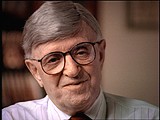
-
Ruth Meyerowitz describes sabotage effort in Malchow munitions factory
Oral HistoryIn Frankfurt, Ruth's family faced intensifying anti-Jewish measures; her father's business was taken over and Ruth's Jewish school was closed. In April 1943, Ruth and her family were deported to Auschwitz. Ruth was selected for forced labor and assigned to work on road repairs. She also worked in the "Kanada" unit, sorting possessions brought into the camp. In November 1944, Ruth was transferred to the Ravensbrueck camp system, in Germany. She was liberated in May 1945, during a death march from the…
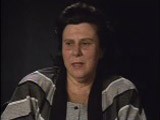
-
Emanuel (Manny) Mandel describes the "Kasztner train" journey to Bergen-Belsen
Oral HistoryEmanuel's father was a cantor who became, soon after Emanuel was born, one of the chief cantors in Budapest. Germany occupied Hungary in March 1944. Systematic deportations of Jews from Hungary to the Auschwitz camp in occupied Poland began in May 1944. Emanuel and his mother were part of the train, organized by Zionist activist Rezso Kasztner, of over 1,600 Hungarian Jews who were to be sent to neutral countries as part of an exchange program. The train arrived at the Bergen-Belsen camp, where the…
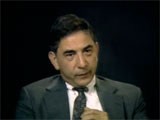
-
Irene Hizme describes being a poster child for Rescue Children
Oral HistoryIrene and Rene were born Renate and Rene Guttmann. The family moved to Prague shortly after the twins' birth, where they were living when the Germans occupied Bohemia and Moravia in March 1939. A few months later, uniformed Germans arrested their father. Decades later, Irene and Rene learned that he was killed at the Auschwitz camp in December 1941. Irene, Rene, and their mother were deported to the Theresienstadt ghetto, and later to the Auschwitz camp. At Auschwitz, the twins were separated and subjected…
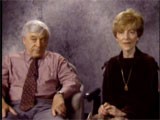
-
Wilek (William) Loew describes Jewish life in prewar Lvov, including restrictions on admission to schools
Oral HistoryWilek was the son of Jewish parents living in the southeastern Polish town of Lvov. His family owned and operated a winery that had been in family hands since 1870. Wilek's father died of a heart attack in 1929. Wilek entered secondary school in 1939. Soon after he began school, World War II began with the German invasion of Poland. Lvov was in the part of eastern Poland annexed by the Soviet Union. Although the Soviets took over Wilek's home and the family business, Wilek was able to continue his…
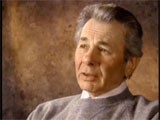
-
Wilek (William) Loew describes political prison in Budapest after the Germans arrested him as a Polish spy
Oral HistoryWilek was the son of Jewish parents living in the southeastern Polish town of Lvov. His family owned and operated a winery that had been in family hands since 1870. Wilek's father died of a heart attack in 1929. Wilek entered secondary school in 1939. Soon after he began school, World War II began with the German invasion of Poland. Lvov was in the part of eastern Poland annexed by the Soviet Union. Although the Soviets took over Wilek's home and the family business, Wilek was able to continue his…
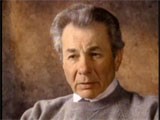
-
Freya (Alice) Lang Rosen recalls experiences while hiding in France
Oral HistoryRecalls experiences while hiding in France
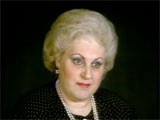
-
Simone Weil Lipman describes helping the Children's Aid Society (OSE) move children to safety in southern France
Oral HistoryWhen Simone was three her family moved to Strasbourg, where her father bred sheep. Simone and her brother were active in Jewish scouting. In 1940, she worked as a teacher in Paris. The Germans invaded western Europe in May 1940. Simone and her family fled German-occupied France for the unoccupied southern zone. There Simone worked at an internment camp for foreign-born Jews. She tried to provide forged documents in an attempt to save lives. Later, Simone assumed a false name and joined the Children's Aid…
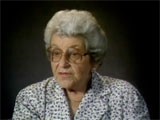
-
Blanka Rothschild describes antisemitic regulations in occupied Lodz, Poland
Oral HistoryBlanka was an only child in a close-knit family in Lodz, Poland. Her father died in 1937. After the German invasion of Poland, Blanka and her mother remained in Lodz with Blanka's grandmother, who was unable to travel. Along with other relatives, they were forced into the Lodz ghetto in 1940. There, Blanka worked in a bakery. She and her mother later worked in a hospital in the Lodz ghetto, where they remained until late 1944 when they were deported to the Ravensbrueck camp in Germany. From Ravensbrueck,…
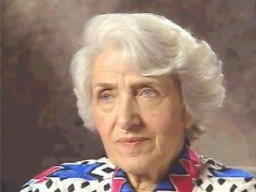
-
Martin Niemöller: Biography
ArticleProtestant pastor Martin Niemöller emerged as an opponent of Adolf Hitler and was imprisoned in camps for 7 years. Learn about the complexities surrounding his beliefs.
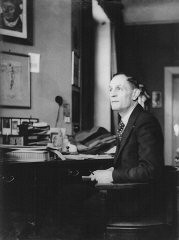
-
Antisemitic Legislation 1933–1939
ArticleHundreds of laws, decrees, guidelines, and regulations increasingly restricted the civil and human rights of Jews in Germany from 1933-39. Learn more.
